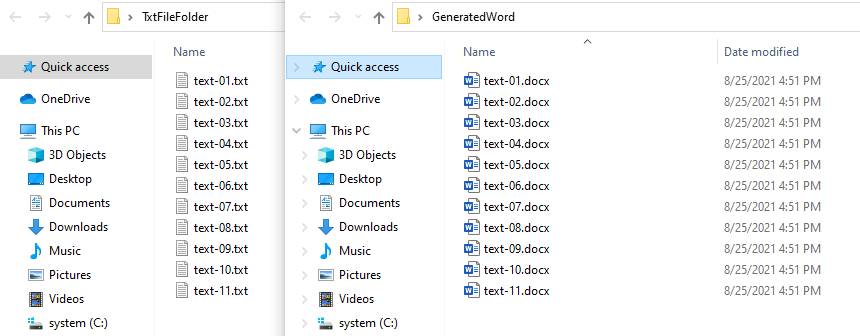erinding's 'solution' does not work!
Word cannot open .txt files that are simply renamed as .docx.
Although Word can open .txt files that are simply renamed as .doc, that does not mean they conform to the .doc binary format - they remain plain text files.
To do it properly, you need a macro like:
Option Explicit
Dim FSO As Object, oFolder As Object, StrFolds As String
Sub Main()
Application.ScreenUpdating = False
Dim TopLevelFolder As String, TheFolders As Variant, aFolder As Variant, i As Long
TopLevelFolder = GetFolder
StrFolds = vbCr & TopLevelFolder
If FSO Is Nothing Then
Set FSO = CreateObject("Scripting.FileSystemObject")
End If
'Get the sub-folder structure
Set TheFolders = FSO.GetFolder(TopLevelFolder).SubFolders
For Each aFolder In TheFolders
RecurseWriteFolderName (aFolder)
Next
'Process the documents in each folder
For i = 1 To UBound(Split(StrFolds, vbCr))
Call UpdateDocuments(CStr(Split(StrFolds, vbCr)(i)))
Next
Application.ScreenUpdating = True
End Sub
Sub RecurseWriteFolderName(aFolder)
Dim SubFolders As Variant, SubFolder As Variant
Set SubFolders = FSO.GetFolder(aFolder).SubFolders
StrFolds = StrFolds & vbCr & CStr(aFolder)
On Error Resume Next
For Each SubFolder In SubFolders
RecurseWriteFolderName (SubFolder)
Next
End Sub
Function GetFolder() As String
Dim oFolder As Object
GetFolder = ""
Set oFolder = CreateObject("Shell.Application").BrowseForFolder(0, "Choose a folder", 0)
If (Not oFolder Is Nothing) Then GetFolder = oFolder.Items.Item.Path
Set oFolder = Nothing
End Function
Sub UpdateDocuments(oFolder As String)
Dim strFldr As String, strFile As String, wdDoc As Document
strFldr = oFolder: If strFldr = "" Then Exit Sub
strFile = Dir(strFldr & "\*.txt", vbNormal)
While strFile <> ""
Set wdDoc = Documents.Open(FileName:=strFldr & "\" & strFile, AddToRecentFiles:=False, ReadOnly:=False, Visible:=False)
With wdDoc
'Save as docx
.SaveAs2 FileName:=Split(.FullName, ".txt")(0) & ".docx", FileFormat:=wdFormatXMLDocument, AddToRecentFiles:=False
'close the document
.Close False
End With
'Delete the old file
'Kill strFldr & "\" & strFile
strFile = Dir()
Wend
Set wdDoc = Nothing
End Sub
The above code processes all .txt files in the selected folder and its sub-folders. Note the commented-out code to delete the .txt file once it has been converted.
For PC macro installation & usage instructions, see: http://www.gmayor.com/installing_macro.htm


